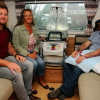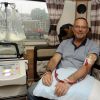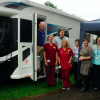
Kidney patients praise freedom and flexibility of home dialysis
The freedom and flexibility brought by home dialysis treatments has been praised by patients during a series of information events run by kidney specialists at the Royal Devon & Exeter Hospital this July.
Over the course of a week the RD&E’s renal community team, with support from charity Kidney Care UK and manufacturers NxStage and Baxter, held five events across Torbay, Honiton, Barnstaple, Taunton and Exeter to demonstrate how home dialysis machines can be easily installed at home or even taken on holiday – freeing-up dialysis patients from the burden of time-consuming hospital visits.
Renal patients, family members, carers and clinicians were invited to come and find out more about the home therapy options available for patients, including peritoneal dialysis and home haemodialysis. They also had the opportunity to meet with current patients, including one person dialysing in a camper van with the transportable haemodialysis machine, showing the exciting potential for travel offered by the treatment.
53 year old Mark Farrar from Woodbury Salterton, who has been using a dialysis machine at home since May, volunteered with his wife Lesha to demonstrate how the therapy has helped him take back control of his life. He said: “I have a type of vasculitis called Microscopic Polyangiitis (MPA) which attacked my kidneys and caused them to fail. I went from being completely healthy to needing dialysis in hospital three times a week. Now thanks to this machine, I have more flexibility to choose when I do it and I can plan my dialysis sessions around my social and work life. And because I can dialyse more frequently at home I feel better and the recovery time is quicker. It’s still a treatment and not a cure - without it I wouldn’t be alive - but it’s definitely the better dialysis option for me.”
Fellow home dialysis patient Jonathan Pile from Exeter agreed, adding: “I dialyse for seven hours over night, every other day. I work shifts so it helps me fit my treatment around my work and gives me more hours in my day. It helps you to get into more of a rhythm and it’s less draining so it makes me feel better.”
Over 200 people took up the opportunity to find out more about home dialysis therapies at the events. At present the RD&E has a well-established peritoneal dialysis programme and a small but growing number of patients on home haemodialysis. The renal community team are keen to continue to increase this number to help transform the lives of more kidney patients in Devon and Somerset.
David Dobbs, Home Haemodialysis Nurse, said: “We were delighted at the number of people who attended the events, many of whom will have to make decisions around their treatment in the near future. Being able to meet and discuss the perspective and experience of current patients receiving a home therapy is invaluable to those exploring possible treatment options.
“We have a growing number of people interested in home dialysis and the many advantages it offers. Having the freedom to dialyse around work, family and social commitments is a huge benefit; but also dialysing more frequently or for more hours, for example overnight, brings potential health benefits including increased energy levels, improved blood pressure control, fewer medications, quicker recovery time after treatment, and very importantly reduced stress on the heart.
“It is vital that patients are able to make informed decisions on their treatment options and find one that is most suitable for them."
Kate Cresswell, Patient Support and Advocacy Officer at Kidney Care UK, commented: “Over the week we were able to meet and speak to more than 200 people with kidney disease. It was a great opportunity for them to find out how home dialysis might work for them as we believe people should be able to choose the treatment that suits their individual needs. Only around a quarter of the patients who could receive and benefit from home dialysis currently do so – which is why events like this are so important.”





















